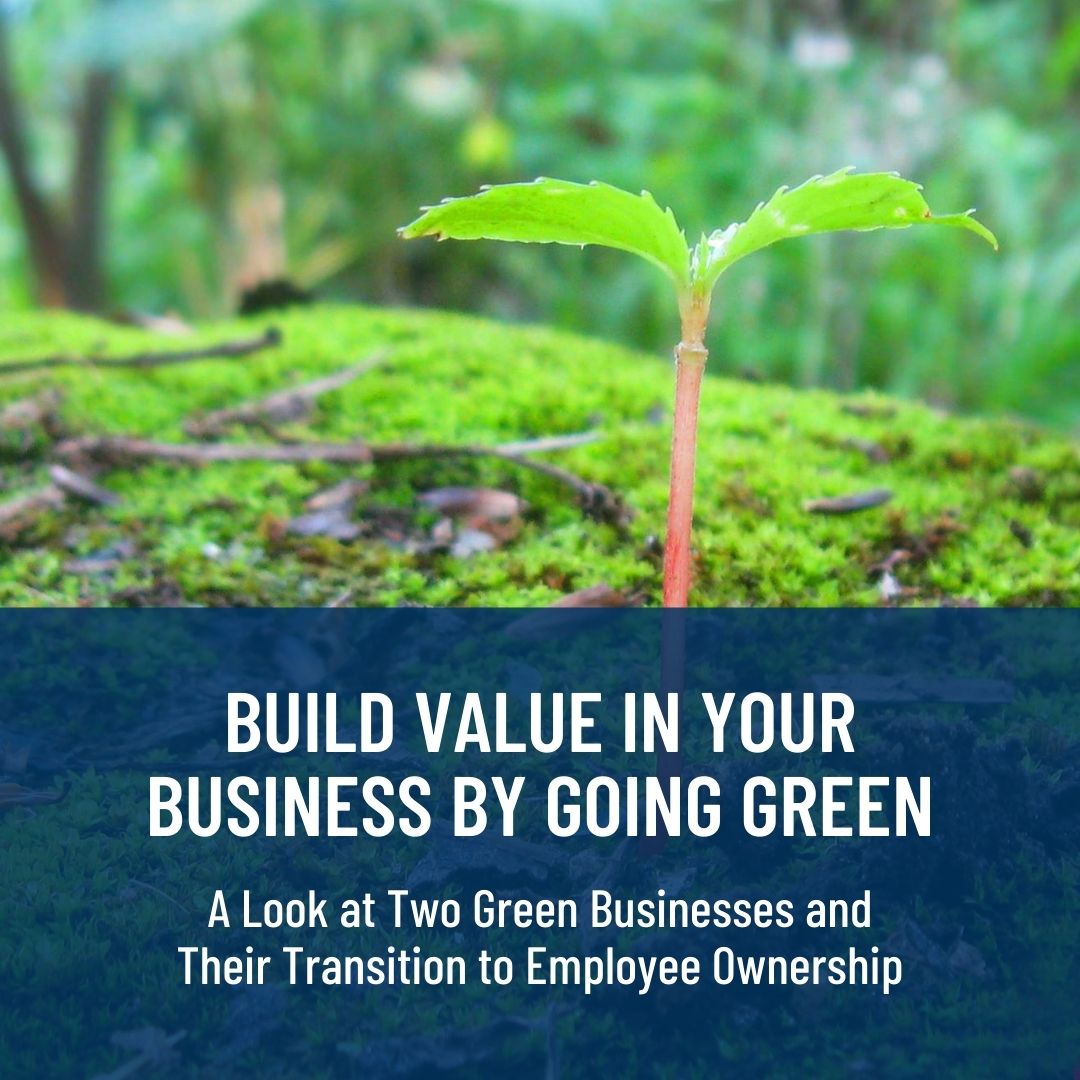
THE EXIT PLANNING BLOG
Keep up-to-date with exit planning, succession planning, industry trends, unique specialty insights, and useful content for professional advisors and business owners.
Share this
The Value of Green Businesses: Two Green Businesses and Their Transition to Employee Ownership
by Colleen Kowalski on April 22, 2022

Large corporations and small businesses alike have a big impact on the environment. According to the State of Green Business 2022 Report, The International Labor Organization estimates that 24 million jobs worldwide could be created by the green economy by 2030. This push towards environmentally conscious business practices has grown in the past few years.
As more businesses implement “green” strategies and processes into their operations, they not only positively impact the environment, but their business value as well. However, when they ultimately exit their company, how do they ensure the future owners of their business have the same passion for the environment?
One way is to transition the company to its employees.
We spoke with the former owners of Happy Earth Cleaning and Cal Solar to understand the impact of employee ownership on their companies. Jesse Dunbar, Former Co-owner of Happy Earth Cleaning, and Lars Ortegren, Founder and Former Owner of Cal Solar, expressed the benefits of transitioning their green businesses to their employees.
Happy Earth Cleaning and Cal Solar: Green Employee-Owned Businesses
According to the Xerox 2021 Corporate Social Responsibility Report, green initiatives grow businesses 28 times faster than average companies. This growth not only builds value in the businesses but has a positive impact on the environment. 50% of major US businesses and 60% of worldwide companies report investing in strategies to reduce environmental consequences.
How Green Initiatives Impact Business Value
Green initiatives not only benefit the environment but help to improve the value of an organization’s intangible capital as well. According to Cone Communications’ corporate social responsibility study, 63% of Americans want corporations to drive social and environmental change in the absence of government action. Jesse Dunbar made green initiatives an integral part of his business, Happy Earth Cleaning. He shares, “our focus on green initiatives kept costs down and profits up, and our team loved working for us for our green principles and the core group stayed on for the transition which helped make the process go smoothly.” He continues, “These initiatives positioned us as one of only a few companies providing this service, our quality of service made us one of the better options in green cleaning in the area.”

Lars Ortegren shares, “At Cal Solar, we have a dedication to people and the planet. Most of us have sustainable beliefs and that’s why we’re in this industry.” This dedication to green operations, products, and services made them a trusted partner for their customers. Lars continues, “Our focus on “green” really motivated people to want to buy into Cal Solar. It has helped with our clientele and our customer base. Our clients see this and it differentiates us over our competitors.”

Why Choose an Owner Exit?
Evan Edwards, CEO of Project Equity, shares, “Employee ownership is an incredible tool to help a business retain its core values while allowing the owner flexibility to exit according to a timeline that suits their needs. This is especially important for green businesses like Happy Earth Cleaning and Cal Solar, whose customer base relies on their commitment to sustainability.” Both companies worked with Project Equity to aid in the transition to employee ownership.
Strong Human Capital
Jesse explains that Human Capital has always been a major factor in the growth and success of the business. He shares, “Since day one, our goal has been to provide a workplace that respects the employees and provides them with a place they can grow. Knowing the team has hands-on support after our departure gives us the confidence to know we are doing the right thing for the employees and ourselves.”
In addition to the employees’ knowledge about the industry and their successes, Jesse also notes that other potential buyers did not fit the company culture. He says, “We had preliminary conversations with potential new owners and none of them had the same focus on green initiatives or people which guided us to selling Happy Earth to the team. If you have a committed team that is interested in owning a business, take the next step and see if employee ownership is feasible for you!”
Flexibility in Your Exit
Lars highlights the importance of listening to all members of the team in order to see success as a company. He was eager to stay in the business but appreciated that the current Co-op model allows him a flexible exit in the future. He shares, “A good business involves a lot more than one brain. You’re relying on a brain trust of strong thinkers to be as adaptable as possible. The beauty of the cooperative model is it involves everybody. It allows everyone to feel vested in the success of the business.”
When asked what he would say to another owner considering an employee ownership option, Lars shares, “First and foremost, if a business already has “ownership culture”, becoming employee-owned gives an owner a no-brainer exit, while ensuring their company can continue to thrive in the same hands that got it there.”
The Importance of Core Values During an Exit
Core values impact the way a team works together, determine the culture of the organization, and embody the purpose and vision of the company. According to recent research, 64% of millennials are willing to decline a job if the company lacks corporate responsibility.
Lars says, “At Cal Solar, we have a dedication to people and the planet. Most of us have sustainable beliefs and that’s why we’re in this industry. Being a Co-op, we really lean on our core values—we can lean into our core values. We discuss them at every meeting. For the people that bought into the Co-op, buying into a company with strong core values was important.”
Jesse echoes this sentiment and states that following core values were important in his exit from Happy Earth Cleaning. He says, “We built the business on our values and wanted to sell to the team to keep the values alive. Failure to stick to them would have been bad business.”
The current General Manager of Happy Earth Cleaning, Rachel Battles, continues, “Eco-friendliness, commitment to helping the broader community, as well as respect and trust among management and employees, were strong values at Happy Earth that led to us choosing to become employee-owned. The transition only amplified those values and allowed us to further live them out! Our values manifested in the fact that we are employee-owned and continue to draw in both new employees and new customers.”
Company Growth Since Becoming Employee-Owned
Both Happy Earth Cleaning and Cal Solar have seen immense growth since transitioning to employee-owned businesses.
Growth Intangible Capitals at Happy Earth Cleaning

According to Rachel Battles, Happy Earth is doing the best they have in its 12-year history. The company has strong Human Capital and provides all members of the Co-op with an IRA match of 3% after they have been with the company for 90 days. She says, “A really remarkable statistic is the turnover percentage; the average for the cleaning industry is around 200% annually. For the fiscal year 2020, the turnover at Happy Earth Cleaning was 71% and for 2021 it is around 52%!”
LA Luebbers, Assistant Manager and founding member of the Co-op, shares, “In my position I meet regularly with our employees to go over feedback and problem solving, so I have a good understanding of the atmosphere at Happy Earth. The staff reports that we’ve fostered a collaborative and open environment, where they feel reassured that their opinions will be considered when making decisions for the company. They feel as if they have a voice, even when they are not members.” They explain the positive impact this has had on their growing customer base as well. They share, “We’ve had multiple customers and employees say they looked into us, and some chose us because we are employee-owned.”
Cal Solar Growth during a Pandemic

Even during the height of the COVID-19 pandemic, the Cal Solar Co-op saw growth and almost doubled in size. Lars shares, “Our fleet has grown from four to seven vehicles, we gained our B Corp status, and we are doing more things in the community.”
Operations Manager and worker-owner, Angelica Niblock, reports that, as of April 2021, the company has 40 employees – employment grew 14% in its first year as an employee-owned business. She continues, “Since becoming employee-owned, wages across the company have increased more than 20% on average, and benefits have grown substantially as well. For example, Cal Solar now pays 80% for employee health insurance, up from 50%, and paid holidays and sick time have increased as well.”
Green Business Practices
Both Happy Earth Cleaning and Cal Solar were able to increase their profitability, improve employee satisfaction, and successfully transition to employee-owned green businesses. Studies show the increasing desire customers have to support environmentally friendly businesses. Additionally, according to a 2018 report by The New Climate Economy, “In combination with action from governments and other stakeholders, businesses that take action on climate change by adopting green policies, technologies, and strategies for growth could realize a total of $26 trillion in economic benefits.”
In honor of Earth Day, we thought we would share a few simple ways to introduce “greener” practices in your business.
- Implement an organized digital filing system to cut down on paper usage in your office
- If your company sends and receives a lot of packages, try to work with a logistics company that offers carbon neutral shipping to decrease your overall carbon footprint.
- Limit electricity usage in areas of your office that are not always used. Not in the conference room? Turn off the lights.
- If your industry permits, allow your employees to work from home at least one day a week. This not only cuts down on carbon emissions from their commute but lessens your electricity usage in your office on those days.
- Provide your employees with the benefit of free access to public transportation to lessen their carbon emissions and give them a safe and reliable source of transportation to work.
Share this
- Blog (523)
- CEPA (370)
- exit planning (244)
- CEPA community (182)
- Business Owner (137)
- Exit Planning Summit (86)
- EPI Chapter Network (83)
- Exit Planning Partner Network (76)
- EPI Announcement (49)
- Content (48)
- Value Acceleration Methodology (46)
- Webinars (37)
- Excellence in Exit Planning Awards (32)
- Marketing (30)
- 2024 Exit Planning Summit (28)
- 5 Stages of Value Maturity (26)
- Books (24)
- Exit Planning Teams (22)
- EPI Team (21)
- Leadership (21)
- 2023 Exit Planning Summit (20)
- family business (19)
- women in business (19)
- Intangible Capital (18)
- Exit Options (17)
- Black Friday (16)
- EPI Academy (16)
- CPA (15)
- State of Owner Readiness (14)
- Chapters (12)
- Chris Snider (12)
- National Accounts (12)
- Small business (12)
- Walking to Destiny (12)
- charitable intent (12)
- personal planning (12)
- Financial Advisors (9)
- 5 Ds (8)
- About us (8)
- Podcast (8)
- Insiders Bash (7)
- Scott Snider (7)
- Christmas (6)
- Exit Planning Content Library (6)
- Case Studies (5)
- Owner Roundtables (5)
- Season of Deals (5)
- Value Advisors (5)
- financial planning (5)
- Awards (4)
- Circle of Excellence (4)
- Exit & Succession (4)
- Five Ds (4)
- executive training (4)
- Owners Forum (3)
- forbes (3)
- EPI Thought Leadership Council (2)
- Exit Is Now Podcast (2)
- Peter Christman (2)
- Three Legs of the Stool (2)
- Veteran (2)
- Whitepapers (2)
- author (2)
- Business Owners Forum (1)
- DriveValue (1)
- business consultants (1)






